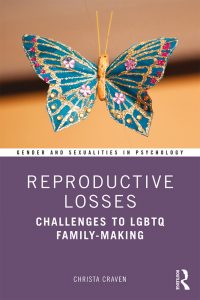 Although the “gayby boom” that began in the 1990s ushered in many new possibilities—socially, legally, and politically—for lesbian, gay, bisexual, transgender and queer (LGBTQ) families, attention to the reproductive challenges they face has not kept pace.
Although the “gayby boom” that began in the 1990s ushered in many new possibilities—socially, legally, and politically—for lesbian, gay, bisexual, transgender and queer (LGBTQ) families, attention to the reproductive challenges they face has not kept pace.
In my new book, Reproductive Losses: Challenges to LGBTQ Family-Making, I explore the distinctive issues that pregnancy and adoption loss raise for LGBTQ individuals and couples. Most Americans still believe that reproductive loss is relatively rare (<5%). But according to experts:
- 10-20% of pregnancies end in loss
- 12% of US women are diagnosed with infertility
- adoption disruption rates in the US are estimated at 10-25% (adoption professionals use the term “disruption” to describe a process that ends after the child is placed in an adoptive home, but before the adoption is legally finalized)
- failure rates for reproductive technologies, such as IVF, are often much higher
For LGBTQ people the stakes for contending with reproductive loss are particularly high. The loss of a child during adoption or pregnancy is often intertwined with discriminatory laws and policies, homophobic/transphobic assumptions by family and/or healthcare and adoption professionals, and the rising costs associated with assisted reproductive technologies and adoption. Yet few resources exist to support LGBTQ people faced with reproductive loss.
Most support resources are aimed at heterosexual married couples (usually also depicted as white, affluent, and Christian) and books on LGBTQ family-making devote only a sidebar to discussing pregnancy or adoption loss, if they discuss it at all. When I interviewed over 50 LGBTQ people who had experienced miscarriage, stillbirth, failed adoptions, infertility, and sterility—including those who carried pregnancies, non-gestational and adoptive parents, and families from a broad range of racial/ethnic, socio-economic, and religious backgrounds—most reported feeling isolated in their experience. As one participant confided to me when we spoke, “I thought I was the only gay person ever to experience the grief of losing a child.” While the belief that they were alone is due in part to pervasive cultural silence surrounding reproductive loss generally, it is amplified for LGBTQ people by outdated assumptions about what makes a “real” parent and who should mourn reproductive loss.
This book shares their stories. It highlights LGBTQ experiences with communal support and personal resiliency, as well as the effects of encountering adversity and discrimination. The book’s open-access companion website also includes their advice for coping with loss and supporting bereaved LGBTQ people, as well as photos that participants shared of commemorative tattoos, memorials, personal remembrances, birth and death announcements, and other ways of memorializing reproductive loss: www.lgbtqreproductiveloss.org. Visitors can contribute additional stories and images to this digital archive and my hope is that it can serve as an expanding resource for LGBTQ+* people and families.
Reproductive Losses and its companion website are aimed at a broad audience—including healthcare and adoption professionals, social workers and psychologists, bereaved LGBTQ families, and family and friends who support them. As the “gayby boom” shows no signs of slowing—and spans a diverse array of families racially, socioeconomically, and religiously—developing more inclusive resources to address the reproductive challenges LGBTQ families face is essential.
Christa Craven is the incoming Dean for Faculty Development at the College of Wooster in Ohio and teaches in Anthropology and Women’s, Gender & Sexuality Studies. In addition to Reproductive Losses: Challenges to LGBTQ Family-Making (2019), she is the author of Pushing for Midwives: Homebirth Mothers and the Reproductive Rights Movement (2010) and a textbook with Dána-Ain Davis, Feminist Ethnography: Thinking Through Methodologies, Challenges & Possibilities (2016). For more information on her research and teaching, see: http://discover.wooster.edu/ccraven/.

Comments